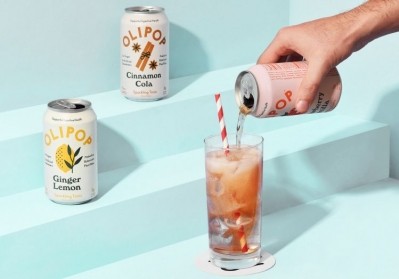Good mood food? Consumers are catching onto prebiotics, says dietitian turned food entrepreneur

“I started to explore the emerging science in this area for a book a few years ago and for the last six or seven years I’ve been really focused on the connection between gut health and mood,” says Landau, who spent most of her life in Australia, where she earned the moniker ‘the traveling dietitian,’ but is now based in New York.
Prebiotics – which promote the growth of beneficial bacteria in the gut - are fermented in the large intestine, producing beneficial short chain fatty acids, which are associated with a series of gut and immune health benefits. One of these, butyrate, also appears to stimulate the production of neurotransmitters such as serotonin (click HERE), and anti-inflammatory cytokines (click HERE), which could reduce stress signals on the brain, claims Landau.
The gut-brain axis
“The nutrition community has been talking about this [the gut-brain axis] for years, but in the last couple of years the conversation has really started to break through into the mainstream media, and I feel like consumers are starting to join the dots.
“But there’s still an education process about what ingredients can be beneficial for gut health, and prebiotics such as green banana flour [which stimulates butyrate production] are still pretty new in the US, although there has been a lot of information about it in the Australian media,” adds Landau, who is a media representative for the new Global Prebiotic Association.
Fermented foods do not necessarily contain probiotics
US food manufacturers, she says, are responding to growing consumer interest in pre-and probiotics, although some have done this with more thought than others: “There is this tendency to sprinkle one functional ingredient [for example a probiotic strain] into an otherwise not particularly healthy product rather than asking, what are the base ingredients in my formulation and do they support gut health and overall health?”
Landau has also observed a trend among some brands to promote fermented dairy foods, kombuchas and apple cider vinegars as ‘probiotic’ when they do not know what bacterial strains are actually in their products and do not have any evidence that the live micro-organisms therein actually survive to reach the large intestine in meaningful amounts and confer a health benefit (to meet the WHO definition of probiotics).
“Don’t get me wrong. Having kombucha instead of soda is great, and kimchi is fantastic, but being ‘cultured’ or ‘fermented’ doesn’t mean these products have a probiotic benefit,” notes Landau.
Consumers, meanwhile, are generally unaware that the ‘live and active cultures’ seal on yogurts just means that they contain a certain amount of lactobacilus and bifidobacterium starter cultures that turn milk into yogurt, and doesn’t guarantee that they have probiotic effects, she says.
“Unless additional named/documented probiotic strains are added, you can’t assume that products featuring the seal contain probiotics.
“I’m also seeing some manufacturers using small amounts of soluble corn fiber or isomalto-oligosaccharides and marketing their products as containing prebiotic fibers, when you actually need quite a high dose to have prebiotic effects, so I think we’ve still got a long way to go on the education process.”
Daily Uplifter
At Uplift: Good Mood Food Landau has combined a series of gut-friendly ingredients backed by clinical evidence in her first retail product: Daily Uplifter, a blend of sprouted fermented pea protein, sacha inchi, mesquite powder, green banana flour (a prebiotic fiber high in resistant starch, which is not digested in the small intestine); Jerusalem artichoke (a source of the prebiotic fiber inulin); five well-documented probiotic strains; and seaweed-based mineral complex Aquamin, which is backed by emerging science suggesting it could help reduce chronic inflammation in the gut.
The product – designed to be added to smoothies and other beverages or sprinkled on yogurt and other products – is best consumed raw, as heating it will kill the probiotics and degrade the resistant starch, something some brands featuring green banana flour as a baking ingredient do not always make clear to consumers, says Landau.
“The UK and Australia are quite forward thinking when it comes to prebiotics and gut health, so I launched the Daily Uplifter in Australia first earlier this year, and within two weeks I was picked up by the largest national organic health food distributor. A few days later I was invited back to New York to take part in the Food-X food accelerator to help me launch in the US, and in the space of a month, I set up production over here as well, so I won’t have to ship the product over from Australia.
“I’m taking this one step at a time, but I’m starting with online sales, then I can look at licensing deals with smoothie chains and salad bars, and then in due course I am looking at making gut-healthy snacks and other products.”
She explains: “The version of the Daily Uplifter you can see on the website now is going to be adjusted slightly for the US market when production comes online here with some additional prebiotics including XOS [xylo-oligosaccharides from sugar beet – which have prebiotic effects], pumpkin seed powder and a couple of other things.”
Interested in gut health?
Probiota Americas (Miami, June 5-7) - brought to you by our sister title NutraIngredients-USA - will bring together leading experts to present the latest scientific, technical and market insights on pre- and probiotics.
Get full details HERE.























